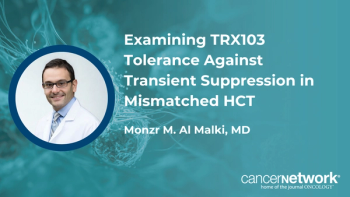
I-WISh Survey Highlights ITP Issues for Patients and Physicians

The survey highlighted the need for further research into the specific effects of ITP in individual patients so that these findings can be better integrated into the management of this patient population.
Results from the Immune Thrombocytopenia (ITP) World Impact Survey (I-WISh) highlighted issues incurred with ITP for both physicians and patients, including fluctuating platelet counts, fear of worsening of disease and dying, impaired social and sex lives, and desire to avoid immunosuppression.
The survey, published in the American Journal of Hematology, also pointed to the need for further research into the specific effects of ITP in individual patients so that these findings can be better integrated into the management of this patient population.
“ITP has an adverse impact on [health-related quality of life; HRQoL] and day-to-day functioning for many patients that can be expressed in many ways,” the authors wrote. “The I-WISh survey provides unique insights into the perspectives of patients with ITP and the physicians who treat them, amplifying understanding of the multifaceted effects of ITP on patients’ lives, one example being the burden of work and reduction in its productivity.”
The cross-sectional survey sought to establish the impact of ITP on HRQoL, as well as productivity from both patient and physician perspectives. Overall, the results included 1507 patients and 472 physicians.
Patients reported that ITP diminished their energy levels (85% of patients), capability to exercise (77%), and limited their ability to perform daily tasks (75%). Similarly, 80% of physicians reported that ITP symptoms reduced patient HRQoL, with 66% also reporting that ITP-related fatigue considerably reduced patient HRQoL.
Patients also indicated they believe ITP has had a substantial impact on their emotional well-being (49%) and 63% worried their condition would worsen. Moreover, due to ITP, 49% of patients reported they had already reduced, or seriously considered reducing their working hours, and 29% had considered terminating their employment. In addition, 36% of patients employed at the time of the survey felt ITP decreased their work productivity, while 51% of patients with high/very high symptom burden reported that ITP affected their productivity.
“This can create conflict in having to work to avoid long-term financial burden on the patient and their family,” the authors wrote. “There is also the conflict of having to take time off to visit (and pay) the physician. This area requires further exploration, but ITP clearly had quite a substantial effect in the approximately 20% of patients with a very high symptom burden.”
I-WISh also highlighted concerns about physical appearance, including bruising, as an issue in 35% of patients with ITP to the extent of wearing long-sleeve clothing. Given this discovery, health care providers working with this patient population should consider the impact of physical appearance and fatigue on HRQoL and adjust their management accordingly. Interestingly, this finding was not different between males and females.
Additionally, 85% of physicians also felt their patients experienced anxiety about platelet counts, while this was only identified as an issue in 53% of patients. Nevertheless, unexplained fluctuations in platelet counts were identified as a major patient concern. Similar proportions of physicians and patients also established fear of dying from ITP as an issue (48% vs 41%, respectively).
“Because of the online method of survey distribution to patients, it was not possible to estimate the response rate ie how many patients declined to complete the survey,” the authors noted. “Nonetheless, I-WISh has been able to extensively explore the patient’s perspective of living with ITP and identify those elements that are most important to the patient providing real-world insight into living with ITP. Discovering the impact on work and fear of dying are among those which are novel and important; however, it was reassuring that the goals of treatment were well-aligned between patients and experienced physicians who concordantly felt that their communications were generally good.”
Reference:
Cooper N, Kruse A, Kruse C, et al. Immune thrombocytopenia (ITP) World Impact Survey (I-WISh): impact of ITP on health-related quality of life. American Journal of Hematology. doi: 10.1002/ajh.26036
Newsletter
Stay up to date on recent advances in the multidisciplinary approach to cancer.










































